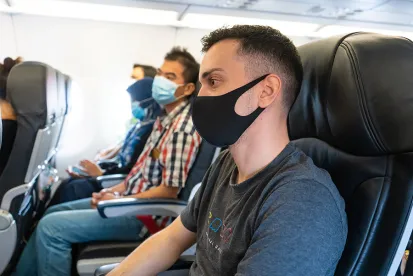A security company did not violate the Fair Labor Standards Act (FLSA) when, under its meal-period policy, it automatically deducted an hour of pay from its security officers on certain flights, the Fifth Circuit Court of Appeals has held. Dean v. Akal Security, Inc., 2021 U.S. App. LEXIS 18621 (5th Cir. June 22, 2021). The Fifth Circuit has jurisdiction over the federal courts in Louisiana, Mississippi, and Texas.
Prior to late December 2017, Akal Security had a contract with the U.S. Immigration and Customs Enforcement agency (“ICE”) to provide security and control of deportees on certain domestic and international flights. These services were undertaken by Aviation Security Officers (ASOs), who were classified as non-exempt hourly employees under the FLSA. On certain return flights for these missions, Akal’s policy provided for a mandatory, unpaid, one-hour meal period on each shift. However, if there were still detainees onboard or if the flight was less than 90 minutes long, the ASOs would be paid for the entire trip without a meal-period deduction.
A group of ASOs filed suit in Louisiana federal court, alleging that the meal periods were not bona fide – and therefore were compensable – under the FLSA. As a result, contended these employees, they were owed additional minimum wages and overtime compensation based on the time deducted for the meal periods. The employees subsequently dismissed their minimum wage claims but pressed forward with their overtime claims. The trial court granted summary judgment to the company and the employees appealed.
In affirming summary judgment for the company, the Fifth Circuit began its analysis with “this simple regulatory sentence: ‘Bona fide meal periods are not worktime.’” The Court of Appeals then applied the “predominant benefit” test to determine if the meal periods provided by Akal were bona fide. The first and second factors of that test ask whether the employees are “subject to real limitations on their personal freedom which inure to the benefit of the employer” or other restrictions on the “employee’s activities.” The ASOs argued that they were subject to multiple limitations and restrictions, including not being able to leave the plane, visit a doctor, go to place of worship, eat at a restaurant, make a phone call, or use the internet. The Fifth Circuit noted, however, that “the effect of any limitations on the ASOs’ activities imposed…must be analyzed in the context of the relevant workplace,” recognizing that the law does not require an employee be allowed to leave the workplace during an unpaid meal period. Moreover, the restrictions complained about by the ASOs are “inherent to working on an airplane.” Thus, these restrictions “do not inure to Akal’s benefit” and “do not undercut the validity of the meal break.”
The remaining factors of the predominant-benefit test ask whether during the meal period the employee remains responsible for “substantial work-related duties” and how frequently the period is interrupted by the employer. In this case, the record established that “the ASOs almost always had at least one hour on the return flight when they had no work-related duties” and that their meal periods were not frequently interrupted. Thus, the meal periods predominantly were to the benefit of the employees and were bona fide.
The Court of Appeals also rejected the employees’ argument that they should be compensated for the meal periods because they did not necessarily eat a meal and because the breaks were not “regularly scheduled.” First, the Fifth Circuit found no requirement in the FLSA that employees consume food for a meal period to be deemed bona fide. Moreover, language from a prior case referring to “regularly scheduled” meals was an explanation of a party’s argument in that case, not a statement that the law requires meal periods to occur at predictable or preset times. Finally, the Court of Appeals concluded that Akal’s failure to record the precise times the meal periods were taken did not, in and of itself, create a violation of the FLSA.
In upholding the company’s meal-period policy, the Fifth Circuit joins the Ninth Circuit Court of Appeals, which upheld the same policy in an opinion issued last year. Alonzo v. Akal Security Inc., 807 Fed. Appx. 718 (9th Cir. 2020). A similar case from a Florida district court remains pending on appeal to the Eleventh Circuit.





 />i
/>i
